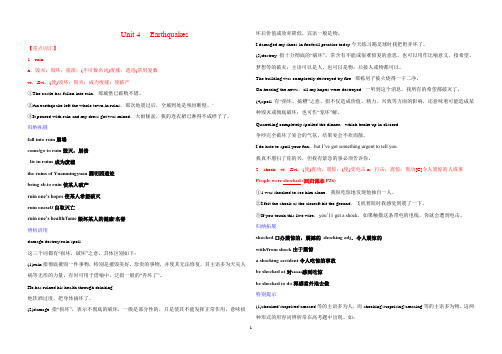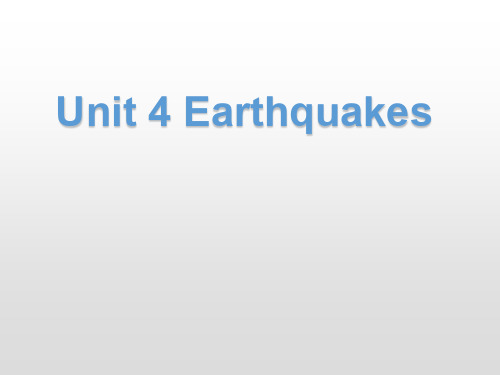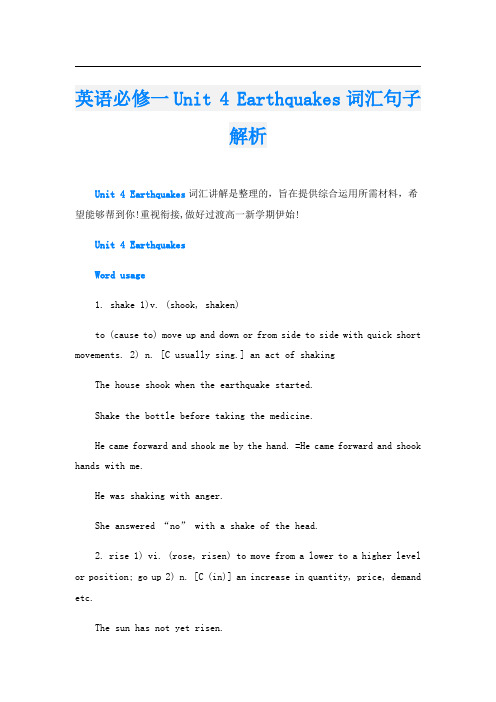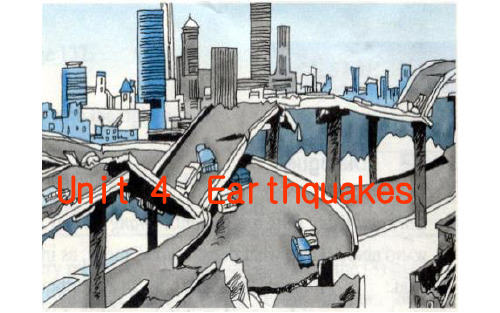高中英语必修一 Unit 4 Earthquakes
高一(上)英语必修一Unit4 Earthquakes重点单词短语归纳整理

Unit 4 Earthquakes【重点词汇】1 ruinn.毁灭;毁坏;崩溃;(不可数名词)废墟;遗迹(常用复数vt.&vi.(使)毁坏;毁灭;成为废墟;使破产①The castle has fallen into rain.那城堡已破败不堪。
②An earthquake left the whole town in ruins.那次地震过后,全城到处是残垣断壁。
‘③It poured with rain and my dress got/was mined.大雨倾盆,我的连衣裙已淋得不成样子了。
归纳拓展fall into ruin崩塌come/go to ruin毁灭,崩溃lie in ruins成为废墟the ruins of Yuanmingyuan圆明园遗迹bring sb.to ruin使某人破产ruin one’s hopes使某人希望破灭ruin oneself自取灭亡ruin one’s health/fame毁坏某人的健康/名誉辨析活用damage/destroy/ruin/spoil这三个词都有“损坏,破坏”之意,具体区别如下:(1)ruin指彻底摧毁一件事物,特别是摧毁美好、珍贵的事物,并使其无法修复,其主语多为天灾人祸等无形的力量。
有时可用于借喻中,泛指一般的“弄坏了”。
He has ruined his health through drinking.他饮酒过度,把身体搞坏了。
(2)damage指“损坏”,表示不彻底的破坏,一般是部分性的,只是使其不能发挥正常作用,意味损坏后价值或效率降低,宾语一般是物。
I damaged my shoes in football practice today.今天练习踢足球时我把鞋弄坏了。
(3)destroy指十分彻底的“破坏”,常含有不能或很难修复的意思,也可以用作比喻意义,指希望、梦想等的破灭;主语可以是人,也可以是物;后接人或物都可以。
人教版高中英语必修第一册 《Unit 4:Earthquakes》教案

人教版高中英语必修第一册 《Unit 4:Earthquakes》教案一、教学目标1.知识目标o学生能够掌握与地震相关的重点词汇和短语,如 “earthquake, ruin, destroy, rescue, shock” 等。
o学生能够理解并运用描述地震现象、危害和救援的句型和表达方式。
2.技能目标o学生能够听懂有关地震的简单对话和新闻报道,获取关键信息。
o学生能够阅读并理解关于地震的文章,分析文章结构和主旨。
o学生能够用英语简单讲述地震的相关知识和个人应对地震的措施。
o学生能够写一篇关于地震预防或救援的短文,表达自己的观点和建议。
3.情感目标o培养学生对自然灾害的认识和防范意识。
o激发学生的同情心和社会责任感,关注地震受灾地区和人群。
二、教学重难点1.教学重点o重点词汇和短语的记忆与运用。
o对课文中地震相关内容的理解和语言表达的学习。
o培养学生用英语描述地震和表达应对措施的能力。
2.教学难点o如何帮助学生理解地震的复杂科学原理和巨大危害,并能用英语进行准确描述。
o引导学生在写作中清晰、有条理地阐述地震预防或救援的观点和建议。
三、教学方法1.直观演示法:通过图片、视频等展示地震的场景和数据。
2.问题引导法:以问题为导向,引导学生思考和探究。
3.讨论交流法:组织学生讨论地震相关话题,促进学生之间的思想交流。
四、教学过程(一)导入(5 分钟)1.播放一段地震的视频片段,展示地震的破坏力。
2.提问学生:What do you see in the video? How do you feel about earthquakes?(二)词汇学习(10 分钟)1.呈现本单元的重点词汇和短语,结合地震的情景进行讲解。
2.通过词汇练习,如填空、选择等,巩固学生对词汇的理解和掌握。
(三)阅读前准备(5 分钟)1.让学生观察课文标题和图片,预测文章的主要内容。
2.提出一些引导性问题,如:What might the article talk about earthquakes?(四)课文阅读(15 分钟)1.学生快速阅读课文,概括文章的主旨。
《Unit4Earthquakes》教案高中必修1英语

《Unit4Earthquakes》教案高中必修1英语爱因斯坦曾经说过:“兴趣和爱好是最好的老师”。
浓厚的学习兴趣,可以使人集中力量,深入思考。
下面是小偏整理的《Unit4Earthquakes》教案高中必修1英语,感谢您的每一次阅读。
《Unit4Earthquakes》教案高中必修1英语教学准备教学目标1.Sswillbeabletomasterthefollowingusefulnewwordsandexpr essions.well,smelly,pond,burst,canal,steam,dirt,injure,brick,dam,usel ess,steel,shock,rescue,quake,electricity,army,shelter,fresh,organize,bury,atanend,digout,coalmine,inruins2.SswillbeabletoknowthebasicknowledgeaboutEarthquake教学重难点1.Theusagesofsomewordsandexpressions.2.Howtotrainthestudents’readingabilityinlearningthetext.教学工具课件教学过程StepIlead-inLetstudentsseeashortvideoandanswerthequestions1.Whathappenedinthevideo?Earthquakes2.Howdoyoufeelseeingtheplots(情节)?Students’discussion.StepIIFastreading1.Whatisthepassagemainlyabout?InTangshan,earthquakesha ppenedonJuly28th19762.SkimthetextandanswerthequestionsThetypeofwriting(写作体裁)NarrativewritingTopicsentenceofParagraph1Sentence1TopicsentenceofParagraph2Sentence2TopicsentenceofParagraph3Sentence1TopicsentenceofParagraph4Sentence1StepIIIDetailedreadingAskstudentstoreadthetextcarefullyandanswerthequestions Task1:Whatwerethenaturesignsofthecomingearthquake?(选择)Para11.Waterinwell(G)2.Wellwalls(D)3.Chickens&pigs(F)4.Mice(A)5 .Fish(E)6.Brightlights(B)7.Waterpipes(C)A.RanoutoffieldsB.intheskyC.CrackedandburstD.DeepcracksE .JumpedoutofpondsF.ToonervoustoeatG.Roseandfell,fellandroseTask2FillintheblanksMainIdeaDetailsDamagecausedbyearthquakePara2-3At_____am,the__________earthquakeofthe20thcenturybegan._______burstfromholesintheground.Hardhillsoftherockbecameriversof____.________coveredthegroundlikeredautumnleaves.Two_______andmostofthebridgesfell.Therailwaytrackswerenow_________piecesof_______.______nowfilledthewellsinsteadofwater.Water,food,and______________werehardtoget.Thereconstruction(重建)aftertheearthquakePara41.Thearmy_____________2.Workers____________forsurvivors.3._____________wastakentothecity.Details:1.At3:42am,thegreatestearthquakeofthe20thcenturybegan.2.Steamburstfromholesintheground.3.Hardhillsoftherockbecameriversofdirt.4.Brickscoveredthegroundlikeredautumnleaves.5.Twodamsandmostofthebridgesfell.6.Therailwaytrackswerenowuselesspiecesofsteel.7.Sandnowfilledthewellsinsteadofwater.8.Water,food,andelectricitywerehardtoget.StepIVconsolidation(当堂巩固)LetstudentsfilltheblanksaccordingtothepassageStrangethingswerehappeninginthecountrysideofnortheastH ebei.Forthreedaysthewaterinthevillagewellskeptrisingand1______ ___(fall).Farmersnoticedthatthewellwallshaddeepcracks2_________ __them.Asmellygascameoutofthecracks.In3_________farmyards,th echickensandeventhepigsweretoonervous4__________(eat).5_____ ____(mouse)ranoutofthefieldslookingforplaces6________(hide).Fis hjumpedoutOftheirbowlsandponds.Atabout3amonJuly28,1976,somepeo plesawbrightlights7_________thesky.Thesoundofplanescould8____ ____(hear)outsidethecityofTangshaneven9_________noplaneswerei nthesky.Inthecity,thewaterpipesinsomebuildingscrackedandburst.Bu ttheonemillionpeopleofthecity,________thoughtlittleoftheseevents,wereasleepasusualthatnight.1falling2in3the4toeat5mice6tohide7in8beheard9when10wh o这部分目的是让学生进一步巩固课文的内容。
高中英语(人教版必修一)Unit4Earthquakes单元教案

中学英语(人教版)必修一第四单元教案Unit 4 Earthquake一.教学内容分析本单元话题为"地震",主要描写了1976年唐山大地震,各项语言活动也都是围绕地震绽开。
本单元共分八个部分。
Warming-up 部分通过两张图片引出话题"一旦地震发生,将会造成怎样的危害",为后面的主题作了一个热身运动。
Pre-reading 部分设置了两个开放性问题,目的是增加学生的生活常识,提高他们的应变实力。
这部分为接下来的阅读作了很好的铺垫,学生可通过套乱,参阅有关地震的书籍并运用一些生活常识来回答这两个问题。
Reading 部分具体描写了1976年唐山大地震的震前、震中和震后。
作者具体描述了地震来临前的一些不正常的自然现象与动物的反常表现;地震的来势汹汹并在顷刻间将整座城市夷为平地;震后人们英勇面对现实并与时实施抢救和重建工作。
Comprehending 部分包括三组练习,主要目的是为了帮助学生更好地理解Reading部分的文章。
Learning about Language 部分分为两个部分:Discovering useful words and expressions 和Discovering useful structures.第一部分要求学生在把握文章的基础上,驾驭重点词汇的词义与时用,这更留意培育学生运用上下文揣测词义的实力。
其次还对一些困难的数字读法进行了检测。
其次部分则结合文章学习定语从句。
Using Language 部分分为Reading,Writing and Speaking;Listening 和Writing。
Reading,Speaking 包括读一篇邀请函,写一份演讲稿和关于一套新唐山邮票的Little talk。
Listening 部分讲解并描述了一位地震生还者的故事,并依据听力材料进行正误推断和回答问题,旨在培育学生获得细微环节的实力,并通过听来仿照标准的语音和语调。
人教版高中英语必修一课件:Unit 4 Earthquakes(共46张PPT)

The world seemed at an end. Everything was destroyed.
__T_h__o_u_s_a_n__d_s_o__f__ families were killed and many children were left without parents.
Signs before the earthquake:
The water _____ in some buildings _p_ip_e_s__ and cracked _____b_u.rst
break
Part 2 Ruins
The damages caused during the earthquake.
After the earthquake
_s_e_n__t soldiers to Tangshan to
The
army:
rescue workers;
o_r_g_a_n_i_ze_d_ teams
to
_d_i_g__o_u_t
those who were trapped and to
bury the dead.
Part 3 (Para 4)
After the earthquake
rescue
Before the earthquake
sign
During the earthquake
damage
Structure of the whole passage :
order of the passage
time order
Disaster: A big earthquake
英语必修一Unit 4 Earthquakes词汇句子解析

英语必修一Unit 4 Earthquakes词汇句子解析Unit 4 Earthquakes词汇讲解是整理的,旨在提供综合运用所需材料,希望能够帮到你!重视衔接,做好过渡高一新学期伊始!Unit 4 EarthquakesWord usage1. shake 1)v. (shook, shaken)to (cause to) move up and down or from side to side with quick short movements. 2) n. [C usually sing.] an act of shakingThe house shook when the earthquake started.Shake the bottle before taking the medicine.He came forward and shook me by the hand. =He came forward and shook hands with me.He was shaking with anger.She answered “no” with a shake of the head.2. rise 1) vi. (rose, risen) to move from a lower to a higher level or position; go up 2) n. [C (in)] an increase in quantity, price, demand etc.The sun has not yet risen.The population of the city has risen to five million.He rose and left the room.There will be a rise in unemployment next year.Theres been a sharp rise in the cost of living.2. pond n. an area of still water smaller than a lake, especially one that has been artificially madeSome cattle were drinking at the pond.There are some fish living in the pond.When an earthquake is coming, fish will jump out of ponds.3. burst 1) v. to (cause to ) break open or break apart suddenly and violently, usually as a result of pressure from within and often cause the contents to become widely scattered.2) n. an act of result of bursting; (of) a sudden short period of great activity, loud noise, strong feeling; outbreakThe balloon burst.After ten days of rain the river burst its banks.A burst of hand-clapping followed the ending of the song.4. canal n. an artificial stretch of water dug in the ground to allow ships or boats to travel alongit, or to bring water to or remove water from an areaCoal used to be sent here by canal.Canals have been built to irrigate the desert.The Panama Canal joins two oceans.5. steam n. [U] 1) water in the state gas produced by boiling2) power or effort produced by steam under pressure, and used for making things work or moveWho invented the steam engine?Steam was used to be the power of a train.There is steam bursting from that hole.6. ruin 1. n. a) [U] the cause or state of destruction and decayb) [C] a building that has been badly damaged or destroyed2. vt. a) to spoil or completely destroy a person or thingb) to cause someone to loss all their moneyThe temple has fallen into ruin.We visited the ruins of the temple.The heavy rain ruined our holiday.The hurricane ruined all the houses here.The flood ruined the crops.If I lose my lawsuit(官司), the cost will ruin me.7. injure vt. to cause physical harm to (a person or animal), especially in an accident; hurt seriously; to damageI hope I didnt injure her feelings.His back was injured.Two people were killed and seven were injured.His reputation will be badly injured by the vicious rumour.8. destroy vt. to damage sth so severely that it can not be repaired; put an end to the existence of; ruinA fire destroyed the house.What he said destroyed our last hope.All hopes of peaceful settlement were destroyed by his speech.9. brick n. [C,U] 1) a hard piece of baked clay used for building2) sth. in the shape of a brickThey used yellow bricks to build the house.The tower is made of bricks.Bricks covered the ground like red autumn leaves.10. useless adj. not of any useThis knife is so blunt. Its useless.I realized it was useless to reason with him.I was useless at maths. = My maths is very poor.11. shock 1) n. a) [C, U] a violent force from sth such as explosion,a crash or a hard blowb) [C, U] the feeling you get after sth unexpected and usually very unpleasant has suddenly happened, or you have received an unexpected piece of newsc) the poor medical condition of someone who has an accident and whose heart and lungs are not working properly2) v. to make someone feel very upset, angry, or unpleasantEarthquake shocks are often felt in Japan.The news of his death was a shock to us.The traffic accident sent him into a state of shock.They were shocked by her rudeness.We were shocked by his sudden death.12. rescue v. to save someone or sth from harm or dangerHe rescued three children from the burning building.The life boat was sent out to rescue the sailors from the sinking ship.The boy was rescued after hours at sea.13. disaster n. [C,U] a sudden event causes great loss or harmWe were all shocked by the disaster.The earthquake is one of the worst natural disasters the country has ever suffered. People began to wonder how long the disaster would last.14. organize v. to plan and arrange an event; to arrange things ina sensible orderWell organize an oral English contest.The story is very well organized.They organized the truckers into a union.15. shelter 1) n. a) [U] protection, especially from bad weather or danger b) a building that protects you from weather or danger.2) vt. to protect someone or sth from bad weather or danger;vi. to stay in a place in order to be protected from bad weather or dangerThe umbrella is a poor shelter from heavy rain.Their immediate need is for food, clothing and shelter.The wall sheltered us from the wind.She was accused of sheltering a murderer.She wad sheltered by the USA.In the rain people were sheltering in the doorways of shops.16. fresh adj. 1) new and different (only before a noun ); 2) recently picked, caught, produced and therefore in good condition (used of food);3) clean, cool and pleasantThey buy fresh meat.This kind of fish lives in fresh water.She is fresh from university.She is quite fresh to office work.17. percent n. parts for each 100The bank has increased its interest rate by one percent.Over ninety percent of the islanders here are illiterate.He spends a large percent of his income on food and drink.18. speech n. 1) [C] a formal talk to a group of listeners2) [U] the ability to speak or the act of speaking3) [U] way of speakingThe chairman made an opening speech.She is researching speech development in children.We express our thoughts by speech.By your speech I can tell youre from Hong Kong.19. judge 1) vi. vt. to decide who or what is the winner in a competition2) [vt. + that] to form or give an opinion about someone or sth after careful thoughtjudging from, judging by…3) n. a public official who has the power to decide questions brought before a court of law; a person who has the knowledge and experience to give an opinion about the value of sthYou cant judge a book by its cover.He is going to judge the first race.We must judge whether he is guilty.The prisoner was taken before the judge.He was one of the judges at the horse race.20. honour 1) n. a) [U] great respect and admirationb) [sing] sth that brings great respect and pride2) v. to show respect to sb. or to praise sb. publiclyWe fight for the honor of our country.He is an honor to our school.Children should be taught to show honor to their elders.He honors his teachers.20. prepare 1) vt. to make sth. ready for a future event or action 2) vi. to get ready to do sth.They prepared themselves for the worst.When we arrived home, mother had already prepared dinner for us.I was preparing for bed when I heard a knock at the door.Useful expressions1. right awayat once ; in no time; immediatelyI will return the book right away.I am getting in touch with him right away.We are about to start right away.2. end1) at an endfinish; overIt seems that the world was at en end.2) bring… to an end =put an end to…I wonder how I can bring the dispute to an end.=I wonder how I can put an end to the dispute.3) come to an endThe meeting came to an end at midnight.4) at the end of…At the end of the road there is a shop.5) by the end of…How many English words have you learned by the end of last term?6) in the end =at last; finallyHe will be a scientist in the end.3. dig out1) to get sth out of a place, using a spade or your hands2) to find sth you have not seen for a long time, or that is not easy to findLets dig out the roots.Why did you dig out all those old magazines?We must dig the truth out of him.1. a (good \ great \ large) number of+ n.(pl.)many; a large quantity of; a lot ofA good number of students are not interested in modern art.Ive seen the film a number of times.The Great Wall attracts a great number of foreign tourists every day.the number of…The number of private colleges has increased.= Private colleges have increased in number.5.give out1) to give sth to a number of different people, especially to give information to people2) to produce light, heat, a sound, a gas, smell etcYou have no right to give my telephone number out.Students were giving out leaflets(传单)to everyone on the street.The teacher gave out the examination papers.The radiator (散热器) is giving out a lot of heat.与give有关的常用短语还有:give away 送掉,捐赠give in 让步,屈服give off 发出(气味、光、热、声音等),此时相当于give outgive up放弃give back 归还6.thousands of基数词+s,并不表示确切的具体数字,可以单独使用,也可以先接介词of 再接复数名词。
人教版高中英语高三必修1Unit4 Earthquakes

❖ 1/3 of the nation felt the earthquake .
❖ A huge crack that was 8 kilometres long and
30 metres wide cut across houses.
❖In 15 terrible seconds a large city lay in
If in a building: Open the
door when it begins to shake.
Never try to use the lift.
Don't rush out without order.
If on a road:
e something hard (硬的) to protect your head.
Para 1 Strange things were happening in the countryside of northeast Hebei.
Para 2 Everything began to shake. It seemed as if the world was at an end.
Topic sentence
Unit 4 Earthquakes
tornado
flood
volcano eruption
earthquake
Flood, Earthquake, Tornado ,Volcano,
Mud flow泥石 流
Hurricane 暴风雨
Hill slide滑坡
Natural disasters
Fire火灾
_ of its factories
Part3(Para 4): filling the blanks
人教版高一英语 必修一 Unit4 Earthquakes 单词[有音标]
![人教版高一英语 必修一 Unit4 Earthquakes 单词[有音标]](https://img.taocdn.com/s3/m/de44e3e519e8b8f67c1cb9d4.png)
canal /kE'nl/ n. 运河;水道 steam /stim/ n. 蒸汽;水汽 dirt /dt/ n. 污垢;泥土 ruin /'ruIn/ n. 废墟;毁灭 vt. 毁灭;使破产 in ruins 严重受损;破败不堪 suffering /'sVfErIN/ n. 苦难;痛苦 extreme /Ik'strim/ adj. 极度的 injure /'IndUE/ vt. 损害;伤害 △ survivor /sE'vaIvE/ n. 幸存者;生还者;残存物 destroy /dI'str|I/ vt. 破坏;毁坏;消灭 brick /brIk/ n. 砖;砖块 dam /dm/ n. 水坝;堰堤 track /trk/ n. 轨道;足迹;痕迹 useless /'juslIs/ adj. 无用的;无效的;无益的 shock /S{k/ vt.&vi. (使)震惊;震动 n. 休克;打击;震惊
人教版 高一英语 必修一 unit 4 共 53个单词、词组
earthquake /':TkweIk/ quake /kweIk/ right away well /wel/ △ c;马上 n. 井 n. 裂缝;噼啪声 vt.&vi. (使)开裂;破裂 △ smelly /'smelI/ adj. 发臭的;有臭味的 △ farmyard /'fmjd/ n. 农场;农家 pipe /paIp/ n. 管;导管 burst /bst/ vi. (burst, burst) 爆裂;爆发 n. 突然破裂;爆发 million /'mIljEn/ n. 百万 event /I'vent/ n. 事件;大事 as if 仿佛;好像 at an end 结束;终结 nation /' neISn/ n. 民族;国家;国民
- 1、下载文档前请自行甄别文档内容的完整性,平台不提供额外的编辑、内容补充、找答案等附加服务。
- 2、"仅部分预览"的文档,不可在线预览部分如存在完整性等问题,可反馈申请退款(可完整预览的文档不适用该条件!)。
- 3、如文档侵犯您的权益,请联系客服反馈,我们会尽快为您处理(人工客服工作时间:9:00-18:30)。
2013年教学设计高中英语科Unit 4 Earthquakes— Warming up & Reading教学设计一、教学内容简析:本课的内容是人教版高中英语必修1 Unit 4 Earthquakes中的Reading阅读理解部分,包括Warming up, Pre-reading,阅读理解课文A Night the Earth Didn’t Sleep和Comprehending内容在内。
Warming up部分提供了唐山地震和美国旧金山地震的两幅图片,要求学生描述地震对这两个城市造成的危害并展开讨论。
Pre-reading部分提供了地震前兆的图片,让学生了解地震前动物和自然界奇特的异常变化。
阅读课文A Night the Earth Didn’t Sleep是一篇新闻报道类记叙文,叙述了唐山大地震前夕的“怪现象”、地震造成的损失及震后的救援情况。
Comprehending部分设置了些练习,主要是帮助学生更好地理解课文内容,培养学生整体把握文章的能力。
二、学习者分析本单元的话题是“地震基础知识(basic knowledge about earth quakes)”和“遇到灾难时如何自救以及帮助他人(how to protect oneself and help others in disaster)”。
具体涉及地震的成因、预兆、地震造成的损失、地震时的应急救生以及震后的救援等内容,对于高一学生来说要完成这些内容的学习也并非是一件易事。
目前,学生上课以interpersonal的交流为主,而interpretative和presentational形式比重不够均衡。
由于文化教学不够重视,学生的跨文化意识不高。
此外,学生跨学科学习的意识不够,语言和信息的双向促进关系的认识不足。
对于比较策略主要运用在英汉汉英互译的语言层面,未进入文化比较和思维比较。
学生的课外语言活动环境不够丰富和重视程度不高,通常以词汇、语法等练习为主,缺乏真实的语言运用。
三、设计理念本教学设计在新课程教学理念的指导下,力求在培养学生的语言知识、知识技能、情感态度、学习策略和文化意识等素养的基础上发展学生综合运用语言的能力,使学生通过观察、体验、探究等主动学习的方法优化英语学习方法,充分发挥自己的学习潜能,形成有效的学习策略。
在设计过程中遵循以学生为主体,教师为主导这一教学原则,创设角色扮演情景、激烈讨论提出建议,让学生最大限度地参与教学过程,尊重学生的主体地位,充分发挥学生在学习过程中的主动性、积极性、创造性,使课堂充满活力。
从教学需要出发,创设情景,进行情景设问、讨论,激起学生的情感体验,激活学生思维,帮助学生迅速、正确地理解和接受知识,并在学习过程中培养其积极进取的科学的人生观及价值观,较好地落实了三维目标。
而三维目标是相辅相成、相互渗透的,所以在情景教学的过程中,知识的落实、能力的培养、情感态度价值观的渗透交融在一起,实现了三维目标的和谐与统一。
四、教学目标:1. Knowledge aims:(1) Let the students learn about the words and expressions of earthquake.(2) Get the students to know basic knowledge about natural disasters.2. Ability aims:(1) Develop the students’reading ability and let them learn different reading skills:skimming, scanning, summarizing, etc. to get information and use information.(2) Improve the students’abilities of listening, speaking, reading and writing.3. Emotional aims:(1) Get the students know damages earthquakes bring about and the ways to reduce losses of earthquakes.(2) Get the students to know how to protect oneself and help others in earthquakes.(3) Get the students to be aware of terrible disasters, meanwhile get them to face it , treat it in a proper way, and never get discouraged.五、教学重点与难点:1.教学重点(1) Get the students to know basic knowledge about natural disasters.(2) Get the students to learn different reading skills.2.教学难点(1) Develop the students’ reading ability.(2) Let the students learn to use the time order when writing.六、课时安排:Period 1七、教学方法:1. Task-based teaching method.2. Cooperative learning.3. Discussion.八、教具准备:The multimedia and other normal teaching tools.九、教学过程:Step1 Lead-inShow students some pictures about natural disasters and ask them:1. Have you ever experienced any natural disaster? Look at the pictures. Can you name all the disasters?21(volcano, fire, flood, sandstorm, drought, earthquake )2. Have you ever experienced an earthquake? Please look at the pictures, and try to describe how terrible an earthquake is.(The earth is shaking; all the buildings will fall down; the roads will be destroyed ; many people will be killed or injured ;a lot of children will become orphans… ) ◆[设计说明]通过多媒体课件向学生展示有关各种自然灾害的图片,让学生了解各种自然灾害的名称从而导入课文主题:地震,让学生初步了解地震的危害,为课文阅读作铺垫。
Step2 Warming up: 3 4 5 6Turn to page 25. Ask the students to read and look at the photos of Tangshan and San Francisco to describe what they see in the two photos to a partner.Tangshan San Francisco (beautiful cities; broad roads; tall buildings; large population…)Imagine there has been a big earthquake in these two cities, what might happen to all the things in the photos?(The whole cities might be in ruins, large quantities of tall buildings might collapse, the broad and busy roads might be destroyed, many people might be killed or injured…)◆[设计说明]通过Tangshan和San Francisco两张图片引出话题“一旦大地震发生,将会造成怎样的危害?”,为本单元的主题作了“热身活动”。
Step3 Pre-reading:Task1: Let the students think over the following questions: Imagine your house begins to shake and you must leave it right away. You have time to take only one thing. What will you take? Why?Task2: What do you think may happen before an earthquake? Talk about the pictures on page25.(Cows, pigs, and dogs become too nervous to eat. They are barking. Mice run out of the fields looking for places to hide, fish jump out of ponds. The water in the well will rise and fall; the well walls will have deep cracks in them. There will be bright light inthe sky.)◆[设计说明]通过这两个任务使学生了解地震前的一些迹象,同时训练学生开口说的能力,激发学生的阅读愿望。
Step4 Reading:Tell the students: Today, we are going to read a news report about the strongest earthquake in China’s history, which happened in Tangshan, Hebei, in 1976.1. Fast readingAsk students to read the passage quickly and pay attention to the first sentence of each paragraph.1) Answer the questions.Question 1: In what order was the passage written?Question 2: What is the general idea of the passage?2) Fill in the table.找中心句、理解文章结构和大意是阅读的基本技能,能帮助学生整体把握文章。
